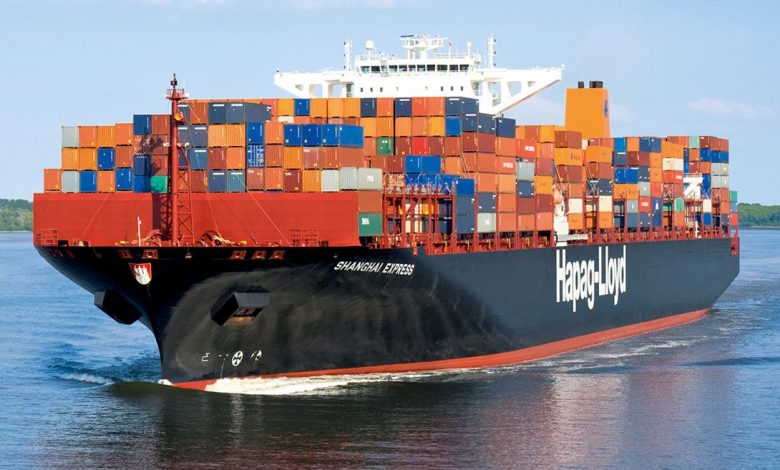Hapag-Lloyd to fine shippers $15,000 per box for any misdeclared hazardous cargoes

With misdeclared hazardous cargoes sparking many dangerous fires on boxships around the world, Germany’s top liner has taken severe action – imposing a fine of $15,000 per wrong container.
Hapag-Lloyd suffered a high profile fire on of its ships, Yantian Express, earlier this year, that raged for weeks and caused millions of dollars of damage.
The new fines system comes into play from September 15.
“To ensure the safety of our crew, ships and other cargo onboard, Hapag-Lloyd holds the Shipper liable and responsible for all costs and consequences related to violations, fines, damages, incidents, claims and corrective measures resulting from cases of undeclared or misdeclared cargoes,” the German carrier stated in a note to clients.
Hong Kong’s Orient Overseas Container Line (OOCL), now a unit of China-based Cosco, also detailed plans yesterday to crack down on misdeclared dangerous and hazardous cargo.
OOCL said in a notice to customers that “we are aware that there had been an increasing number of marine incidents being reported in 2019, many of which were suspected of potentially carrying un-declared and/or misdeclared hazardous cargo”, adding that “to ensure safety compliance on shore and at sea is met, OOCL will strengthen its Dangerous Cargo acceptance and container inspection policy by imposing additional verification before loading through selective or random inspections on dangerous goods and potential dangerous goods cargo.”
OOCL said any inconsistencies between the declared cargo in the documents and what was physically inside the container would result in a Hazardous Cargo Misdeclaration Fee, without indicating how severe the fine would be.
Depending on the type of deficiencies found in such a shipment, the container could be put out of service and the cargo might be put on hold where penalties may be imposed, and charges associated with the misdeclaration would be on the shipper’s account.
According to the Cargo Incident Notification System (CINS), nearly 25% of all serious incidents onboard containerships are attributable to misdeclared cargo.
While the exact breakdown of cargo contents varies by container, it’s well known that at any given time, between 5-10% of an average container ship’s cargo is declared as hazardous goods and approximately 12% of global container trade comprises dangerous goods. However, it’s nearly impossible to know how much dangerous cargo is undeclared, or misdeclared.
Commenting on the news from Hapag-Lloyd, Andy Lane, a container shipping consultant based in Singapore, applauded the initiative and urged other liners to follow suit. “The booking party is not always the payer, so they will need to ensure that the penalties are imposed or else it can become a toothless tiger. $15,000 will not cover the cost of accidents, but it might cover the cost of inspections and enforcement. All shippers should embrace this, as 99.9% suffer today due to errant actions of the 0.1%. The other carriers will need – and should – follow suit, as those errant shippers who consciously fail to declare will direct this scourge elsewhere. The is no priority higher than crew, ship and cargo safety,” Lane told Splash.
Splash lead columnist Andrew Craig-Bennett has repeatedly urged for a different solution to solve the scourge of fires caused by dangerous goods. Craig-Bennett has called on all liners to stop charging higher prices to carry dangerous goods.
“The incentive for shippers to lie disappears as soon as this is done. Yes, the shippers of harmless cargo will be subsiding the shippers of dangerous goods. But their own cargo will be more likely to arrive,” Craig-Bennett wrote in an earlier opinion piece.
Splash is awaiting responses from a host of other lines to see if there will be collective stance from the world’s top carriers in issuing fines on misdeclared cargoes.

 , earlier this year, that raged for weeks and caused millions of dollars of damage.
, earlier this year, that raged for weeks and caused millions of dollars of damage.
Fully in support of this, i also hope they make a point of charging the first few shippers they catch – some sort of deterrent is needed. I almost feel this isn’t enough.
I agree 100% with the thought behind this and believe that $ 15,000 is simply not enough – if anything it should be 10 times this at least.
However, if someone is willing to take the risk to deliberately mis-declare IMO cargo then they are hardly likely to be dissuaded by the threat of a $ 15k ‘fine’.
Also, a shipping line or carrier have the legal right to issue or impose fines? Surely this is a matter for legal process (Court action). Imagine there is a dispute about who made the false declaration (trader, shipper, buyer, forwarder, etc) or the exporter says he didn’t know the difference between ‘hexasulphate and hexasulphite’ and then you have an endless questioning of intent.
Bottom line is that the Lines still need to look at themselves and do all the due diligence they can to identify reputable shippers and to understand fully what is going in THEIR boxes on THEIR ships.
Whatever happened to the Maersk initiative to open any container they suspected?